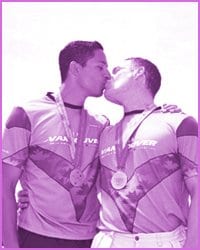With medals gleaming on their chests, Team Vancouver’s world weary athletic and cultural participants will begin returning home this week after the eight-day long Gay Games celebrations in Sydney, Australia. In the sweltering 35 C heat, athletes battled for their place on the podium, sought to beat rival teams and to reach their own personal best. They will return sporting gold, silver and bronze medals while others will proudly return with a participation medal for their part in competition at the Games.
Team Vancouver sent the largest city team in North America, second in size only by Team Sydney-which had more than 1,500 participants marching in the opening ceremonies. Resplendent in peacock green and blue uniforms (once again the single hottest item for trading among athletes), the more than 350 Team Vancouver members strutted into the arena to a near-capacity crowd at Aussie Stadium.
Directed by Ignatius Jones, the Opening Ceremonies was the highlight of the week’s festivities. The glamorous and star-studded event wowed both participants and spectators. Led by Team San Francisco, the 13,000 participants marched in the Participants Procession (some of them waiting nearly five hours in nearby Sydney Cricket Grounds), and wound their way onto the field to create a continuous triangle. Antarctica made its first appearance this year, the sole representative from Iraq received some of the loudest cheers, and spectators were on their feet when it was announced that India and Pakistan would be marching into the stadium together.
Pompoms were left on every seat in the stadium, some pink, some white, producing a clever sea of pink triangles during the hilariously camp pompom dance led by Aussie television characters Kath & Kim. Australian icon Judi Connelli, along with Paul Capsis and Jimmy Somerville, brought the crowd to their feet while kd lang’s numbers were an audience favourite. A queer choir sang Happy Birthday to kd only to be joined by the rest of the 30,000 audience members, much to lang’s surprise.
But it was out gay Australian High Court High Court Justice Michael Kirby’s rousing speech that left an impression that resonated through the entire week.
“Let the word go out from Sydney and the Gay Games of 2002 that the movement for equality is unstoppable,” he said in his welcoming address to spectators and participants. “Its message will eventually reach the four corners of the world. The Games will be another catalyst to help make that happen. Be sure that, in the end, inclusion will replace exclusion. For the sake of the planet and humanity it must be so. And by our lives let us be an example of respect for human rights. Not just for gays. For everyone.”
Kirby’s speech was discussed by the thousands of queers that filled the nightclubs, bars, cafes and streets of Sydney. Indeed, no city was better prepared for the onslaught of gays than the Gay Games host city itself, though the level of organization of the Games themselves came nowhere near that set by Amsterdam four years ago. Pubs relaxed their capacity limits, bars became home to visiting city teams, and hotels were proud to display the flags of the visiting countries from their balconies and windows.
Oxford Street was the place to be on the final Saturday evening as medal-bearing competitors strolled the gay district getting last minute phone numbers and congratulating each other for a week of hard work.
Sport and cultural events were held near and far, making it difficult for athletes and spectators to see more than one sport a day. A few sports were held at the hallowed grounds of Olympic Park, making it easy to catch swimming, volleyball, track and field, and tennis in one area. No competition was better situated however, than the sailing regatta in Rushcutter’s Bay. Lucky spectators caught a glimpse of the action as they headed on ferry boats to nearby Manly.
The Gay Games celebrated their first sanctioned same-sex figure skating competition, held their first women’s wrestling exhibition event and Sydney 2002 co-chair Bev Lange announced that more than 200 Gay Games records were broken in the swimming pool alone. The Pink Flamingo relay race was still the hottest selling ticket for the final day of swimming events, while the chilly venue for the ice hockey finals was a relief from the stifling heat.
Bea Arthur’s one woman show was one of the most popular events of the cultural festival. Free music and entertainment at the Hub along with a meeting place at Hyde Park with food stalls, massage tent and open bandstand for participants, kept people returning to catch their favourite act again. Free art displays were posted throughout the city, including Garrie Maguire’s Gods & Warriors homoerotic photography show at the Sydney Aquatic Centre.
The Closing Ceremonies was a low-key completion to the end of eight days of events. It saw the hand-over of the next Gay Games event to the city of Montreal in 2006.

 Why you can trust Xtra
Why you can trust Xtra


